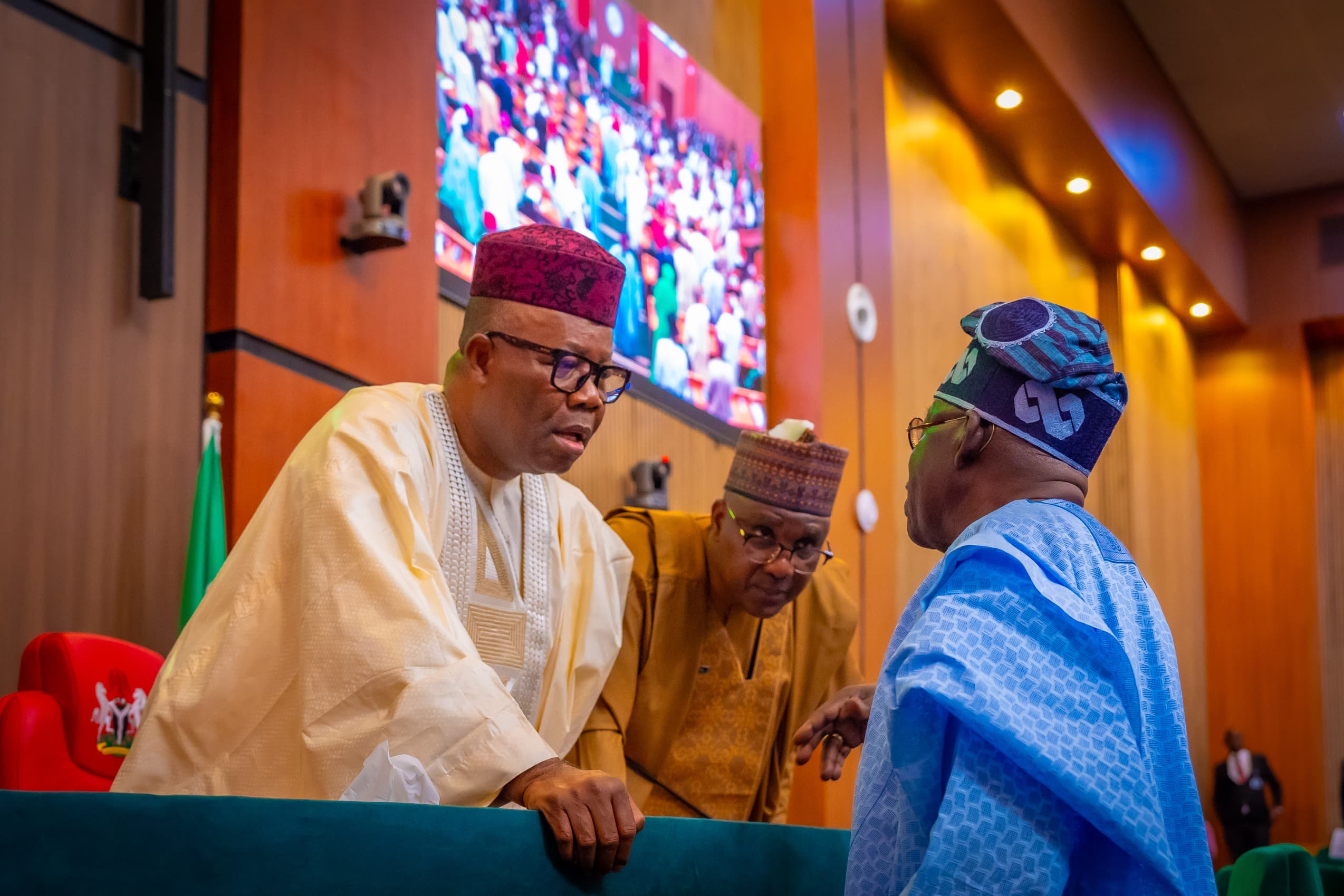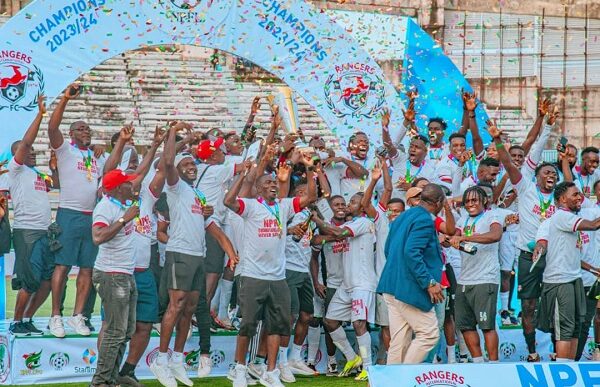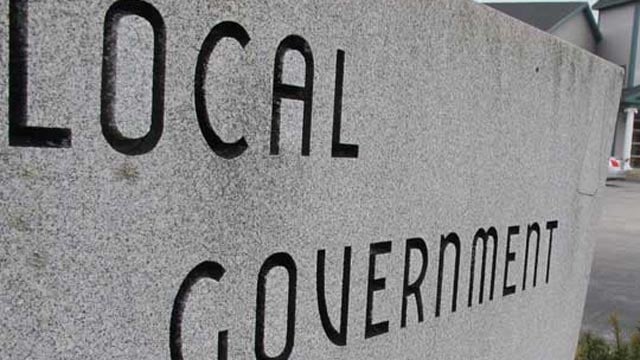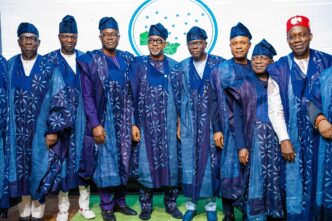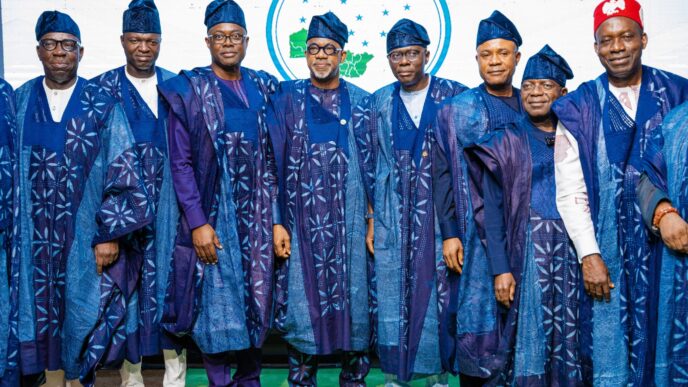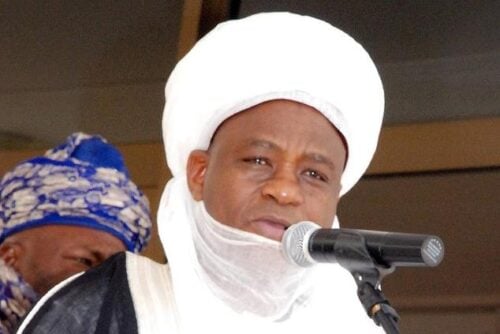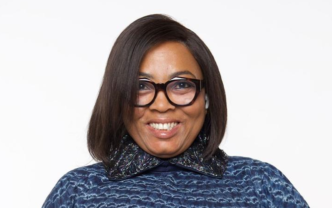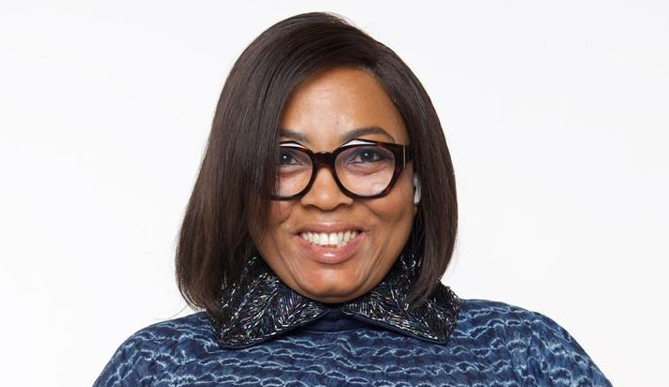Senate President Godswill Akpabio, Tajudeen Abbas, reps speaker, and President Bola Tinubu
I have read many literatures about how Nigeria was coupled as a nation, by those who hadn’t the remotest of connections with it. It was done, I understand, out of administrative convenience for the British colonial masters, as a finishing touch to what was done in Berlin (Conference) Germany, in November 1885 when some people gathered to share Africa and its resources among themselves. This happened in several other countries across the world regarded as colonies, thus giving no room for the emergence of a “raison d’etre” among the various ethnic nationalities that were coerced into the contraption, as a basis for their union.
Examples abound in Europe, of countries, where hitherto distinct groups have come together to form a nation or confederation. Switzerland (made up of seven cantons) is one, the Scandinavia countries (Denmark, Sweden, and Finland), Belgium (the Flemings and the Walloons), Spain (comprising Castilians, Catalans, Basques, Galicians, and Valencians) the United Kingdom (England, Scotland, Wales, Northern Ireland). Before now, there was the Soviet Union (Russia, Ukraine, Georgia, Belarus etc.), Czechoslovakia (Czech Republic, Slovakia), Yugoslavia (Bosnia and Herzegovina, Croatia, Montenegro, North Macedonia, Serbia, Slovenia and the yet-to-be-fully-recognised Republic of Kosovo). The list goes on, and on. These groups have at one time been together as one united country with a raison d’être before they went their separate ways. Some reasons are cultural, linguistic, defence, Geographic, economic, trade-related, among others.
But that was hardly ever the case in most African countries, Nigeria, and West Africa by extension, for instance. We (who were forcibly co-opted into the unions) share, if any, very little mutual experience, history, common traits, or interests, that could bring about a mutuality of feeling, vision, interest and watertight unity. The only group with a unity of purpose in Nigeria are the privilegensia – the political and economic elites who find themselves in positions of power, and use that as an opportunity for self-aggrandizement, and class preservation. That is the basis for the hackneyed phrase by Nigerian politicians, that “Nigeria’s unity is not negotiable.” But I shudder to ask; says who? Says, the beneficiaries of the phantom unity, rooted in the common interest in pillaging our common patrimony.
As part of the delusions we go about within Nigeria, someone said (permit me to paraphrase) “If God does not have a purpose for Nigeria to be a one-and-united nation, we wouldn’t have survived the 1967 civil war.” On that note, some people now believe rightly or wrongly that no matter the situation, Nigeria can never be Balkanised again, and on that basis, they embark on reckless adventures in their greed-fueled endeavours and are always ready to set Nigeria ablaze with their tongues, whenever certain things do not go their ways. Well, I am not a prophet of divisiveness because I see so many reasons for us be united, and strongly so. I also believe in the unity (in diversity), being a veritable source of national cohesion. But I am afraid, we’re taking our luck too far, by not taking time to listen to those who are aggrieved, rightly or wrongly, among us.
Advertisement
My fellow compatriots, why is there nobody in and around Aso Rock, listening or willing to listen to a Nnamdi Kanu, a Bello Turji, a Sunday Igboho, an Abubakar Shekau, a Simon Ekpa, with a view to discerning what his grievances are, and addressing same? Is it because they’re making the mistake of channelling the expression of their grievances through ethno-religious or provincial pipe? If that is the case, well, I am afraid Nigerians are now wiser, as ethno-religious leaning does not exempt anyone from paying exorbitantly for tomatoes, petrol, diesel, cooking gas, rice, beans, yam, and other essential commodities in the market. That I am convinced, would dictate how they go about organising themselves for the next “class action,” which might be of a higher dimension and impact than the #ENDSARS protest, witnessed in October 2020.
I have always wondered why can’t President Bola Tinubu borrow a template from the late President, Umaru Musa Yar’Adua, when he came on board in 2007, and decided to listen to the agitators, whose campaign of violence against critical oil and gas infrastructures in the Niger Delta was at its crescendo then? After listening to their grievances, the late president started with the amnesty programme, enjoining all the militants to turn in their arms and ammunition, in exchange for amnesty, and socio-economic empowerment, in form of skills acquisition, and scholarship for those who were willing to go to school.
Under the amnesty programme, some were sent abroad for schooling on federal government scholarship, while others were sent on an apprenticeship where they acquired skills set that make them become employable in the oil and gas industry. And ever after, everyone was left happier than before, while relative peace reign in the creek. But in this present situation, nobody seems to be listening to anybody, on how they cope with the effect of the administration’s twin policy of “subsidy removal, and floating of the Naira against the dollar.” Prices of essential commodities have gone out of the roof. Feeding (two square meal) daily has become a luxury of some sort. Cost of healthcare service is up there. Nigerians are getting much poorer by the day since May 29, 2023, when President Bola Tinubu infamously announced the twin killer neoliberal policies.
Advertisement
As though, Nigerians not enjoying any form of policy in their daily lives is not enough, the federal government has gone ahead to continue to explore avenues through which more tax handles would be introduced to further erode whatever remains of the people’s purchasing power. The Tinubu administration seems to have forgotten that, we can only talk of the economy doing well when people are empowered to be economically active through robust economic policies that go beyond the mere tokenism of cash transfer to the so-called “vulnerable,” which in turn exacerbate the inflationary situation. You can’t continue to tax people, as if you want to tax them into non-existence, especially, if they’re the same people you expect to drive the economy.
Talking about the expected benefits of subsidy removal for the people of Nigeria, it is like a never-ending expectation. Nigerians are daily being told about the need to make sacrifices, without the politicians being ready to lead by any example. Rather, they strive to expand the frontier of their acquired taste for anything luxurious. The only beneficiaries of the purported benefits of subsidy removal are the 36 State Governors. It translates to more revenue for them — enough fund to play with. Enough money to fund their obsession with flyover bridges and white elephant projects. So, with the current arrangement and how things are being run, the Governors who have subsumed the local government under their rapacious “greed for money,” turn out to be the ultimate beneficiaries. What the majority of them now do is, erect flyover around their States’ capital, even where it is least needed, while other areas that could have eased the living condition of the masses are left unattended to. Access road construction, affordable and accessible healthcare services, subsidy for agricultural inputs that would crash the sky-high prices of food stuffs is far from being on their priority list.
I think, it is imperative to remind the governments at all levels that, the street is not smiling at the moment. Things are getting harder. Nigerians are getting more frustrated by the non-people-friendly policies of the federal and state governments. Tomato has been taken off the list of condiments, housewives buy at the snap of fingers. It has witnessed about 500% price increase in the past two months, depending on your location. The same with beans, rice, onions among others.
In the past, Nigerians have chosen different platforms that are ethno-religiously inclined to express their grievances. Among them are the Oodua People’s Congress (OPC), Movement for the Actualisation of Sovereign State of Biafra (MASSOB) Yoruba Nation, Miyetti Allah, Egbesu Boys of Africa, the Indigenous People of Biafra (IPOB), even Boko Haram. All these and many more have one common denominator — feeling of marginalisation. They do not feel included in the scheme of things. I am not oblivious of the fact that, in democracy, the minority would have their say, but the majority would have their ways. But, that does not preclude the interests and concerns from being taken care of.
Advertisement
Rather than engage these groups, however, the federal government being the only entity with a monopoly on the use of the state’s instrument of coercion, in some cases decides to visit them with violence. The federal government and the majority of us might be rejoicing that these agitators have, to a large extent, been decimated. But you don’t underestimate the power of resilience of a people fighting for survival and self-preservation. You can only suppress their agitation with the instrumentality of the security apparatus, but that will soldier on remains intact. That is why they say, “it is safer to reconcile with an enemy, rather than conquer him because, conquering him will only deprive him of his weapon, while reconciliation weans him from the will to fight on.”
Now, with the way things are going, people are, someday, going to express their grievances, but it won’t be along ethno-religious divides. Rather, it’s going to be in the mould of Marxian class struggle, between the haves, and the have-nots; between the proletariat and the bourgeoisie; between the governed and the government; between the oppressed and the oppressors. It will be something akin to what we witnessed on the 20th day of October 2020, when the youths across many sectional divides united to say “No to police Brutality”, #ENDSARS. This is because, the adverse effects of misgovernance, do not impact the livelihood of the people on religion or ethnicity. The same goes for the effects of potholes on dilapidated roads on your vehicle’s shock absorbers. Do I need to say that we all buy foodstuffs, petrol, drugs, and other essential commodities in the market at the same rate? Nobody is given those items at a lower rate because he is of certain ethnic stock, religious or political leaning. We are in it together, good or bad.
Therefore, one thing that those who think they own Nigeria need to know is that, Nigeria is currently going through a process of that bifurcation between the elite and the masses; the rich and the poor. Between those who can afford to buy food and those who cannot. If that government that is responsive enough to listen to their plights and formulate policies that would frontally address them does not come along in time, we may not be able to rule out an implosion of the dimension of an apocalyptic cataclysm.
By the time Nigerians organise themselves, not along ethno-religious lines, but based on their socio-economic positions and experiences, and move to reclaim their destinies by whatever means from the political hangers on, it might be very difficult or too late for the political elite to atone for their sins of decades.
Advertisement
Until the ruling class is ready for the conversation on what angers the different agitators from different parts of the country (let us pretend as if they don’t already know it), Nigeria might just be sitting on a keg of gunpowder that is ready to explode at the slightest spark. Until they’re able to empathise with the masses and stop assaulting our collective sensibility by approving the purchase of a new aircraft for the president in the midst of acute hunger in the land, the danger of such an implosion looms.
Has that leader (who listens) come in the shape of President Tinubu? If yes, now is the time to engage every group, whether along ethno-religious lines or economic situation in the society, in a dialogue so as to hear them out with a view to addressing those grievances — real or imagined, and bring an end to the campaign of blood across the land, curb hunger ravaging the land like wild harmattan fire.
Advertisement
One of the beauties of democracy is the existence of avenues for agreeing to disagree in order to agree. That is, we engage each other in continuous dialogue to ascertain, and appreciate our mutual differences, as well as grievances, and find a way around it such that intergroup hostility would not take the place of amity. Remember, in an atmosphere of rancour and acrimony, there can be no meaningful development to the advantage of all.
So, now that the leader of the proscribed IPOB, Mazi Nnamdi Kanu, appears to be condemning the campaign of violence by those who claim to be fighting for the “liberation” of the people of Biafra thereby turning the entire South East to a killing field, it won’t be a bad idea if the federal government seizes the opportunity to leverage on the momentum gathered by such a conciliatory move by the detained leader and address their grievances.
Advertisement
It takes a leader who listens to do this. When will that leader be here?
Abubakar writes from Ilorin, Kwara state. He can be reached via 08051388285 or [email protected].
Advertisement
Views expressed by contributors are strictly personal and not of TheCable.
Add a comment

